On D-Day, A Remembrance of Sacrifice
I work on staff here at GFC as an executive assistant and one of my work tasks during the COVID-19 season has been to produce posts for the Life at Grace blog on our website. This means thinking of topics that might be interesting during a certain week or season, contacting potential writers within our congregation or that work with local ministry partners, collecting blog content and photos, and finally, building, editing, and posting the blogs. These posts are typically about recent online group experiences, at-home communion during COVID-19, community service projects, or even a member’s heart for a certain topic or holiday. But, we normally don’t feature posts that have nothing directly to do with GFC, its members, or ministry partners.
However, as I looked at the summer calendar to think through some topics for upcoming blogs, there it was… June 6. D-Day. I felt compelled to share something about the Second World War and those that sacrificed so much for their country and families. I remembered a friend whose dad is still living and was a U.S. soldier during the war. I’d met him several times over the years and thought he might enjoy a stroll down memory lane – via video conference, of course.
So, one day last week, I had a FaceTime chat with a nearly 99 year old World War II veteran, Corporal Technician Eli A. Torbett, Jr., or “Tab,” as he likes to be called. Tab is a native of Piney Flats and is currently living in an assisted living facility in Johnson City.
Here’s a summary of our conversation:
How did you come to join the U.S. Army?
“I was drafted in 1942. It was inevitable. I was living in Baltimore doing electrical work in a shipyard. Went to the mailbox one day and there it was. My draft notice.”
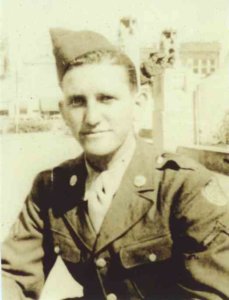 How old were you at the time?
How old were you at the time?
“I was 20 when I was drafted. I’ll be 99 this August. Born August 19, 1921.”
What was your training like?
“First there was basic training in Camp Maxey, Texas, but then I traveled all through the south, like to Camp Swift, Texas, and other places for advanced training for ground combat and artillery. I had to learn how to load and shoot a Howitzer, which is a big mounted gun that we could drag around to where we needed it. Then on to Louisiana for maneuvers. I served in the 381st Field Artillery Battalion, Battery C, 102nd Infantry Division of the Army.”
Did you participate in D-Day?
“I wasn’t at Normandy, but I was in Germany at the time. At that day and time, it wasn’t called D-Day. It was just known as ‘the invasion.’ The radio started broadcasting bulletins about the invasion in the middle of the night and early morning. I remember hearing one and I knew it wouldn’t be long before I was headed there. Those men were brave and knew they could be dead before their feet touched the sand.”
Click here to listen to the NBC Radio announcement of
the invasion of France, broadcast on June 6, 1944.
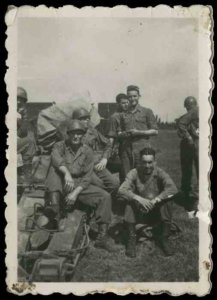
Above, Tab is pictured standing.
Where did you first see combat?
“I was stationed in Le Havre, where at first I helped truck supplies up to the front, then after about a week I went into position on the front lines. We coordinated positions and had 4 big guns that we took turns firing. One would fire, then the second, then number 3, and number 4. Then we’d start again. A lot lost their lives in Le Havre as well.”
Did you believe in God at the time, and if so, how did that help you while serving?
“Yes. I always had my faith in my heart. I believed in Jesus Christ. I didn’t fear much at all. I knew He was with me.”
Do you have a favorite Bible verse that you clung to then or cling to now?
“Matthew 7:12. ‘Do unto others as you’d have done to you.’ That’s the Golden Rule. That’s how we’re to treat each other, no matter who you were.”
Did you stay in Le Havre the whole time?
“I served in many places in France and Germany. I was in the Battle of the Bulge and served in Passau, Germany. Toward the end of the war, I was guarding German prisoners of war. Most of these men were just like me. They were kind and funny and just wanted to go back home, if it still stood. They were drafted just like I was and that doesn’t mean they shared Hitler’s mindset.”
One day, I needed a shave. One of the POWs was a barber before the war and said he could give me a good shave. So I let him. I leaned back in a chair while a German soldier shaved my exposed neck and face with a sharp as fire straight razor.”
So I asked him, “Mr. Tab, weren’t you scared he’d slit your throat.” He replied…
“Nah. My buddy had a gun to his head the whole time.”
What was the most amazing thing you saw during your time overseas?
“The Eiffel Tower. I took a picture from a building across from the tower and then went to the tower to take a picture of the building so I could remember both perspectives.”
What was the most heartbreaking thing you saw?
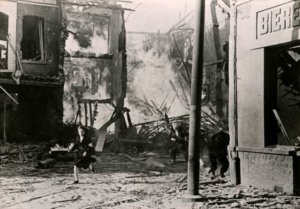
A burning building, France, 1944.
“There was a building with Dutch, French, and Polish people inside. There were probably other nationalities in there as well. They had been gathered there to be held captive. The Germans would herd entire neighborhoods and villages into buildings. There was straw on the floors, which is where they were supposed to go to the bathroom. The Germans set the building on fire and because of the straw, it went up in flames quickly. There were these ground level windows and the people were burning alive, but still trying to get out. If they made it free, the German soldiers would shoot them.”
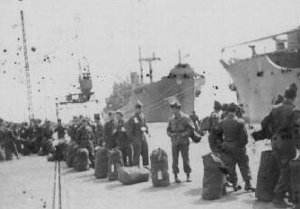
U.S. homeward bound ships, 1945.
What do you remember about the end of the war?
“It was September of 1945 and we were in Germany. When we were told it was over, we all jumped up and down and shouted. It still took a little while to get things settled there and to come home, I think a couple of months, but we got to the U.S. and I had to come through Indiana to be discharged. They gave me my separation papers, fifty dollars, and sent me on my way.
We didn’t know about the concentration camps and all that was happening to the Jews while in France. We learned of it toward the end of the war and when we came home. You didn’t hear about things back then like we do now.”
What did you do when you got back to Piney Flats?
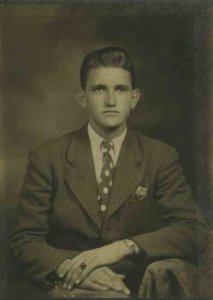 “I worked on my family’s farm and greenhouse, and also did some electrical work at Bays Mountain. Later on, I opened my own greenhouse, the Tri-City Plant Farm.
“I worked on my family’s farm and greenhouse, and also did some electrical work at Bays Mountain. Later on, I opened my own greenhouse, the Tri-City Plant Farm.
I met my wife Peggy at a cake walk at Mary Hughes School. I saw her and said, ‘I’m gonna marry her.’ We got married in 1949 and were married for 69 years when she passed away in 2018. We adopted our only child, a little girl we named Kevyn.
I’ve lived a good long life with many blessings.”
What do you enjoy doing now days?
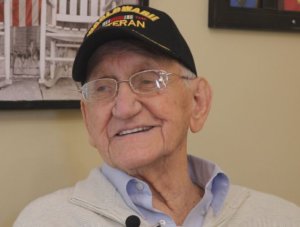 “I like to take care of my plants in the yard outside my window and play piano and laugh and visit. And play on my new computer.” {he giggled after he said the part about his new computer}
“I like to take care of my plants in the yard outside my window and play piano and laugh and visit. And play on my new computer.” {he giggled after he said the part about his new computer}
What would you want to say to the next generations of people in America?
“To keep in mind what has been sacrificed throughout the years for us to enjoy our freedoms today. We only had the radio to tell us about the war and the invasion, but I remember they televised the Normandy invasion in the 1960’s. The men had guns, but you could see them falling as they were shot while pushing through the sand and up the wall. There will always be someone before you that died or sacrificed a lot for your freedoms.”
Mr. Tab’s life and service have contributed to our community and lives. May we keep in mind this anniversary of D-Day those that have sacrificed so much throughout the years for our earthly freedoms.
Ashlee White



